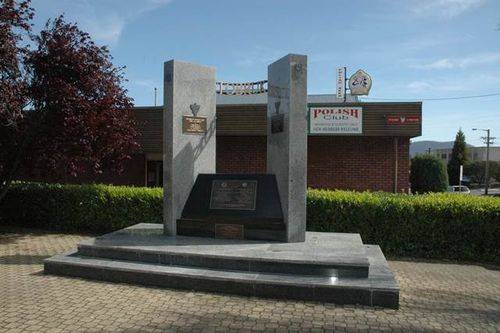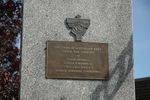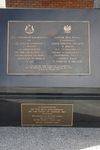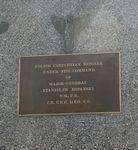
Home » Themes » Conflict » World War Two
Siege of TobrukPrint Page 
The monument, erected by the Polish Association, commemorates the Polish and Australian forces that served in the Siege of Tobruk in 1941 during World War Two. Funds were received in 2013 to repair damage caused by vandalism.
The monument consists of two rectangular vertical blocks of polished granite which are linked by the word "Tobruk" in bronze at the top. Between the two blocks is a polished black stone. All inscriptions are in bronze. A plaque was added to the memorial to commemorate the 50th anniversary of the siege.
Three months after the German invasion of Poland in 1939, the Polish Commander-in-chief decided that a Polish unit in the French territory of Levant be created. In April 1940, the Independent Carpathian Rifle Brigade was formed in Syria. The Brigade comprising over 4,000 men was eventually moved to Palestine and placed under command of the British. In June 1941 the brigade was ordered to relieve the exhausted Australian troops defending Tobruk. The Poles were moved by a number of ships into Tobruk at night during a moonless period. At first, the Australian response to the Poles was one of bemusement since the Australians were keen to be rid of the desert heat, sandstorms and the constant bombardment from artillery and bombing. On the other hand the Poles were ready to unleash their vengeance and appeared to relish the idea of going to battle. The Poles earned a fearsome reputation and held on to their positions from September through to November 1941. After the war, over 1500 former members of the Polish military migrated to Australia, including many who had served with the Independent Carpathian Rifle Brigade in Tobruk. A large number joined the Rats of Tobruk Association.
The Siege of Tobruk was a confrontation that lasted 242 days between Axis and Allied forces in North Africa during the Western Desert Campaign of World War Two. The siege started on 10 April 1941, when Tobruk was attacked by an Italo–German force under Lieutenant General Erwin Rommel.
Australians provided the mainstay of the Tobruk defence force until August, when they were withdrawn and replaced by the British 70th Division, with the attached Polish Carpathian Brigade. British forces lifted the siege on 10 December 1941 during Operation 'Crusader', when 1st Army Tank Brigade linked up with a 'break out' force from Tobruk - the 32nd Army Tank Brigade - at Ed Duda, to the south-east of the town.
The “Rats of Tobruk” was the name given to the soldiers of the garrison who held the Libyan port of Tobruk against the Afrika Corps during the Siege.
The garrison, commanded by Lieutenant General Leslie Morshead, consisted of the 9th Australian Division (20th, 24th, and 26th Brigades), the 18th Brigade of the 7th Australian Division, four regiments of British artillery and some Indian troops.
Location
| Address: | Elizabeth Street & Augusta Road, New Town, 7008 |
|---|---|
| State: | TAS |
| Area: | AUS |
| GPS Coordinates: | Lat: -42.867613 Long: 147.311459 Note: GPS Coordinates are approximate. |
Details
| Monument Type: | Monument |
|---|---|
| Monument Theme: | Conflict |
| Sub-Theme: | WW2 |
| Actual Event Start Date: | 10-April-1941 |
| Actual Event End Date: | 10-December-1941 |
Dedication
| Actual Monument Dedication Date: | Saturday 11th December, 1982 |
|---|
This monument was erected by the Polish Association in Hobart
To commemorate the Polish - Australian brotherhood in arms established in Tobruk in 1941.
[ Inscription in Polish ]
Unveiled by the Governor of Tasmania His Excellency Sir James Plimsoll AC CBE on 11th December 1982.
Plaque :
In commemoration of the 50th anniversary of the Siege of Tobruk 1941
To honour 562 Australian and 133 Polish soldiers who are buried at the War Cemetery - Tobruk, Libya.
We will remember them
The units of Australian Army under the command of Major-General Leslie J Morshead CMG CBE DSO ED
Tobruk Fortress Commander
Polish Carpathian Brigade under the command of Major-General Stanislaw Kopanski VM PR CB CBE DSO CG








